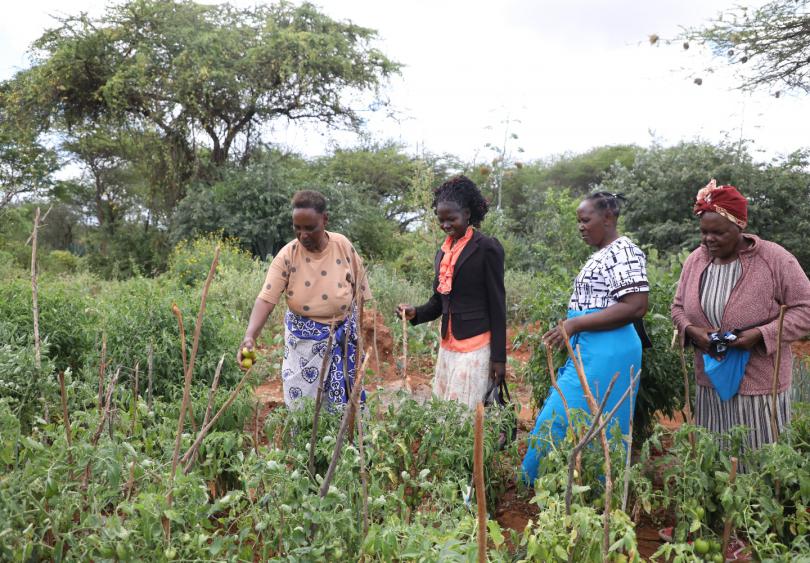EMPOWERING WOMEN, NOURISHING COMMUNITIES: THE INSPIRING JOURNEY OF PAULINE KONGO AND THE TIKWENDA KWITU SELF HELP GROUP IN KENYA

Pauline Kongo, who chairs the Tikwenda Kwitu self-help group, holds some tomatoes picked from her farm. Photo Credit: Dorothy Waweru,Save the Children
By Dorothy Waweru, Communications Assistant, Save the Children and Joyce Nyaboga, Capacity Strengthening Advisor, USAID Advancing Nutrition
In the heart of Kitui County's Mwingi West Sub-County east of Nairobi, we find Pauline Kongo on her farm. A proud mother of four children and a grandmother to seven grandchildren, Pauline's resilience shines through as she diligently feeds her chickens with maize seeds, despite being differently abled.
Pauline's dedication extends beyond farming. She chairs the Tikwenda Kwitu (Not by Will) self-help group—a group formed by 12 women, including youth and persons with disabilities. This unique group recognizes the power of collective efforts in farming and other activities. Pauline points out that unlike other self-help groups in Kitui County, Tikwenda Kwitu embraces the inclusion of people with disabilities, believing in their ability to bring positive change through agriculture. Tikwenda Kwitu’s activities include sharing best practices in poultry and goat rearing, as well as cultivating nutritious crops like green grams, fruits, and millet. These efforts yield significant benefits, improving their family's diet and generating income through sales.
"When we started farming, we faced a lot of challenges because we lacked knowledge of nutrition and farming techniques suitable for this arid and semi-arid area,” Pauline said. “Due to the drought conditions in Kitui, it was even harder acquiring drought-resistant seeds,” she recalls. Fortunately, Caritas, a civil society organization under the Catholic Diocese of Kitui, intervened, providing valuable training on the nutritional benefits of local foods for children, kitchen gardening, efficient water usage for vegetable and fruit tree farming, and proper livestock care. This support substantially enhanced the group's understanding of the advantages of nutrition-sensitive agricultural practices.
Florence Ndeti, Caritas Program Director, explains that although nutrition already formed part of their livelihood programs, their collaboration with USAID Advancing Nutrition, USAID’s flagship multi-sectoral nutrition project, revealed the potential for further collaboration with community self-help groups and county government departments including health, agriculture, social protection, education, and water and sanitation, at both technical and leadership levels.
“When we started collaborating with USAID Advancing Nutrition, we realized the benefits of sensitizing community self-help groups on good nutrition-sensitive practices of small-scale gardening and wise water management,” Florence said. “This is how we managed to identify Tikwenda Kwitu self-help group, which was already involved in agricultural activities but was not keen on the nutrition-sensitive aspect.”
Reflecting on the benefits gained from Caritas related to nutrition-sensitive agriculture, Pauline says she is now more attentive to the food she feeds her children, thanks to her increased knowledge of nutritious foods. Previously, she admits that she would prioritize selling her farm produce before considering the nutritional status of her household.
"I am grateful for all the knowledge that I have received,” she said. “It has not just been beneficial as a source of livelihood but also for my family because I now appreciate and know what a good balanced diet is. I am more aware of the nutritional value of different foods, and I am happy that I am able to pass this down to my family,” Pauline says she has also witnessed the impact of nutrition-sensitive agriculture on the families of other group members.
By rearing chickens, goats, and cultivating various crops, including fruits, the Tikwenda Kwitu group has achieved both nutritional and financial benefits. Women who previously faced financial challenges can now sell their produce and afford to pay school fees for their children. They have even established a table banking system, also known as a merry-go-round, which involves pooling savings and providing loans to group members, with a 10% interest rate to replenish and grow the revolving fund.
Furthermore, the inclusion of persons with disabilities has elevated Tikwenda Kwitu’s standing within families and among communities. Empowered with knowledge on improving nutrition and enhancing financial capabilities, they have become integral contributors to their households. Pauline encourages women, including those with disabilities, to join self-help groups like Tikwenda Kwitu. These groups offer valuable knowledge on proper nutrition and techniques for farming on small plots of land with minimal resources and water. She emphasizes the significant support from Caritas CSO, in partnership with USAID Advancing Nutrition, which has supported Tikwenda Kwitu's self help activities. The group aspires to continue sharing knowledge of nutrition-sensitive agriculture with other community members, ensuring that every child, particularly the most vulnerable, benefits from their parents' involvement in nutrition programs.
USAID Advancing Nutrition has impacted the lives of thousands of people across Kisumu, Kitui and Kakamega counties through nutrition-specific and sensitive interventions. 10 Civil Society Organizations(CSOs) across these three counties have received capacity strengthening and have been able to address some of the challenges they faced such as, limited access and minimal awareness to nutrition policy frameworks, ad-hoc engagement in the nutrition coordination platforms, lack of advocacy skills and lack of formal alliances for CSOs. In addition, 126 nutrition champions in the 3 counties have been trained on how to advocate for better nutrition in their communities which is a huge milestone in the fight for improved nutrition outcomes in the three target counties.

Pauline on her farm with a few Tikwenda Kwitu self-help group members. The group includes persons with disabilities and aims to empower members to become integral contributors to their households through agriculture and other activities. Photo Credit: Dorothy Waweru,Save the Children